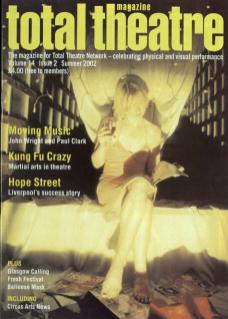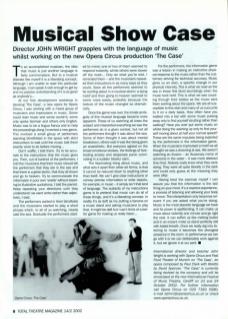To an accomplished musician, the idea that music is just another language is fairly commonplace. But to a musical illiterate like myself it is a liberating concept. Although I am unable to read this particular language, I can speak it well enough to get by and my passive understanding of it is as good as anybody's...
At our first development workshop in devising The Case, a new opera for Opera Circus, I was working with a mixed group of musicians and improvisers in music. Some could read music and some couldn't; some only spoke German and others only English. Music was to be a lingua franca, and to help the proceedings along I invented a new game. This involved a small group of performers standing blindfolded in the space with strict instructions to wait until the music told them exactly what to do before moving..
Don't waffle, I told them. Try to be accurate to the instructions that the music gives you. Then, out of earshot of the performers, I told the musicians that their music should tell the performers that they are in the sea and that there is a great storm, that they all drown and go to heaven. Try to communicate the information in your own words without resorting to illustrative quotations, I told the pianist. Keep repeating your directions until they understand: we want verbs rather than adjectives, I said.
The performers waited in their blindfolds and the musicians started to play a short phrase which, to all of us watching, clearly said the sea. Gradually the performers started to move; one or two of them seemed to respond instantly, whilst others were slower off the mark... Only do what you're told, I reminded them – and the musicians repeated their instructions in as many ways as they could. Soon all the performers seemed to be swirling about in a nautical storm; a dying motif and then going to heaven seemed to come more easily, probably because the texture of the music changed so dramatically.
Once the game was over, the innate ambiguity of this musical language became more apparent. Those of us watching all knew the subject and interpreted everything we saw the performers do in a given context, but not all the performers thought it was about the sea. Some of them thought it was about mental breakdown; others said it was like being given an anaesthetic. But everyone agreed on the broad emotional strokes, the feelings of foreboding anxiety and desperate panic culminating in a sudden blissful calm.
The fascinating thing about music, and what sets it apart from other artforms, is that it cannot be reduced down to anything other than itself. We can't give clear instructions or convey precise information or write reports, for example, in music – it simply isn't that kind of language. The audacity of my instructions game is to pretend that music can do all of these things, and it's a liberating concept. In reality it's as daft as my putting a banana on a music stand and asking musicians to play that. It might be daft but I can't think of a better game for making us really listen...
For the performers, the information game was a lesson in making an instinctive physical response to the music rather than the customary striving for technical accuracy. Music gives us an élan, a specific change in our physical intensity. This is what we read as the sea in those first blind stumblings when the music took hold. This is what we saw coursing through their bodies as the music sent them swirling about the space. We are all susceptible to this élan and many of us succumb to it on a daily basis. How often have you walked into a bar with some music pulsing away only to find yourself strutting rather than walking? Have you ever put some music on whilst doing the washing up only to find yourself moving about at half your normal speed? These are the same impulses being exploited by the performers in the information game. When the musicians improvised a motif we all thought we saw a drowning at sea. We weren't watching an illusion – an illusionary mime of someone in the water – it was more abstract than that. Nobody really knew what they were doing. They were all quite literally in the dark and could only guess at the meaning they were after.
Having tried the exercise myself I can assure you that the information is the last thing on your mind. It's a reactive experience, a process of listening and allowing your body to move. The interpretation only becomes relevant if you are asked what you're doing. Music is the most atavistic language we have and its power is spellbinding. It can make us move about violently one minute and go rigid the next. It can soften us like melting butter and in an instant make us stand perfectly still with bated breath. Once we really dig into listening to music it becomes the strongest presence in the room. In performance we can go with it or we can deliberately work against it, but we ignore it at our peril.
International director and teacher John Wright is working with Opera Circus and Fast Food Theater of Munich on The Case, an opera composed by Paul Clark with libretto by David Spencer. The Case is currently being devised by the company and will be showcased at the new International Festival of Music Theatre, Cardiff on 23 and 24 October 2002. For further information check www.operacircus.co.uk

